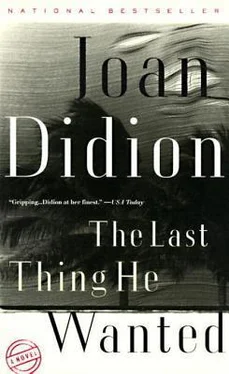Who would miss him, who would care?
Who would not believe he had done whatever it was they were going to say he had done?
An old man in a sick season.
An old man with no reputation to lose.
The shipments had just been the cheese in the trap.
She had sprung the trap and her father was dead and now she was set up to do whatever it was that he was supposed to have done.
Somebody had her lined up, somebody had her jacked in the headlights.
Had her in the scope.
Had her in the crosshairs.
What she did not know was who.
And until she knew who, until she located the line of fire, she could not involve Wynn.
She needed Wynn out of the line of fire.
She needed Wynn to take care of Catherine.
The question of why Treat Morrison arrived on the island was another area in which neither Rand nor the congressional investigators did a particularly convincing job, but in this case there would have been daunting structural obstacles, entire layers of bureaucracy dedicated to the principle that self-perpetuation depended on the ability not to elucidate but to obscure. “The cooperation of those individuals and agencies who responded to our numerous requests is appreciated,” the preface to the Rand study noted in this connection. “Although some other individuals and agencies did not acknowledge or respond to our requests, it is to be hoped that future assessments of this incident will benefit from their assistance and clarification.”
I also knew at the time why Treat Morrison arrived on the island, but it was not an answer calculated to satisfy the Rand analysts.
Treat Morrison arrived on the island for the buzz.
The action, the play.
Treat Morrison arrived on the island because it was one more place where he could insert himself into a certain kind of situation.
Of course he had a “mission,” a specific charter, and he also had a specific agenda. He always had a specific mission when he inserted himself into this kind of situation, and he also always had a specific agenda. The agenda did not necessarily coincide with the charter, but neither did it, if the insertion was smooth, necessarily conflict. “Certain people in Washington might have certain front-burner interests they want me to address, and that would be my charter,” he once told me to this point, his tone that of someone explaining to a child what goes on at the office. “Typically, however, there might be some other little angle, something they maybe don’t know about or think is back-burner. And I might also try to address that.”
That would be his agenda.
Treat Morrison’s charter in this case was to correct or clarify whatever misunderstandings or erroneous impressions might or might not have been left during the recent tour of the region undertaken by a certain senator and his senior foreign policy aide. There had then been a subsequent trip, made by only the senior foreign policy aide, who was twenty-seven years old and whose name was Mark Berquist. Various questions had been raised, by American embassy personnel in the countries involved, having to do with what the senator and Mark Berquist were doing in these countries and with whom they had been meeting and what, during such meetings, had been said or not said. These questions, which of course derived from a general suspicion that the visits may have lent encouragement if not outright support to what were usually called “unauthorized fringe elements,” had languished awhile on the Caribbean and Central American desks and then, once it seemed clear that no answers would be forthcoming, had been strategically leaked out of Tegucigalpa to the ranking American reporters who covered the area.
“According to well-placed embassy sources,” was the way the New York Times had attributed the questions.
The Los Angeles Times had added corroboration from “a European diplomat experienced in the region.”
The Washington Post had relied on “knowledgeable U.S. observers.”
In the brief flurry that followed, Mark Berquist defined the purpose of his trips as “strictly fact-finding,” “generally focused on business and agricultural matters” but “not in any area of particular interest to you.”
The senator himself said that he had made the trip only to “encourage participation in what is getting to be in our state a very active and mutually beneficial sister-city program.”
The call for a hearing died before it got to subcommittee.
Which might have been the end of it had the visits from the senator and Mark Berquist not been followed, at least in the area on which Alex Brokaw’s embassy reported, by certain incidents, not major but nonetheless troubling, in that they tended to legitimize the “previously reliable source” who had in late June reported the existence of a plot to assassinate Alex Brokaw.
There had been for example the two steamer trunks apparently abandoned in a windward condominium that had been rented, at the time of Mark Berquist’s second visit, by a young Costa Rican woman who had since disappeared, skipped out on the weekly rent. When the owner returned he found the steamer trunks, which he moved into the hallway to be opened and discarded. The trunks sat in the breezeway for ten or twelve days before the janitor got around to opening them. According to the police report on the incident the contents of the two trunks included twenty Galil semiautomatic assault rifles, two AK-47s, seventeen silencers, three walkie-talkies, three bags of ammunition, assorted explosives and detonators and electronic devices, four bulletproof vests, and two sets of scales. According to the embassy report on the incident the presence of the scales argued for a drug connection and rendered the incident not of immediate concern. The embassy report further concluded that the absent Costa Rican tenant was not an asset of any U.S. agency known to the embassy.
That the tenant (no longer absent, since her body had been subsequently found in a ravine off the Smugglers’ Cove highway) was not an asset of any U.S. agency known to the embassy was one thing Treat Morrison doubted.
A few days after the business with the steamer trunks (but before the young woman’s body turned up) there had been the incident outside the Intercon, within minutes of Alex Brokaw’s scheduled speech at a chamber of commerce lunch in the Intercon ballroom. There had been a small crowd, a demonstration of sorts, having to do with the question of who was responsible for the precipitous loss of the tourist business. It was the contention of the demonstrators that the United States was responsible for the precipitous loss of the tourist business. It was the contention of the embassy, and this was the point to which Alex Brokaw had intended to address his remarks, that the loss of the tourist business would be more than compensated for by the economic benefits that would accrue not only to this island but to the entire Caribbean basin were the United States Congress to approve military aid to the Nicaraguan freedom fighters for fiscal year 1985.
Economic benefits that were even now accruing.
In anticipation.
In recognition of the fact that there was already, let us be perfectly up front on this point, a presence.
A covert presence, true.
But only in anticipation of overt.
This was the subtext of the message that Alex Brokaw, alone in the back seat of his reinforced car, had been attempting to condense to an index card as his driver inched through the demonstrators outside the Intercon toward the police barricade set up at the entrance. The actual text of the message he was committing to the index card was this: Just ask your friends the merchants of Panama what the United States Southern Command has meant to them.
Читать дальше












